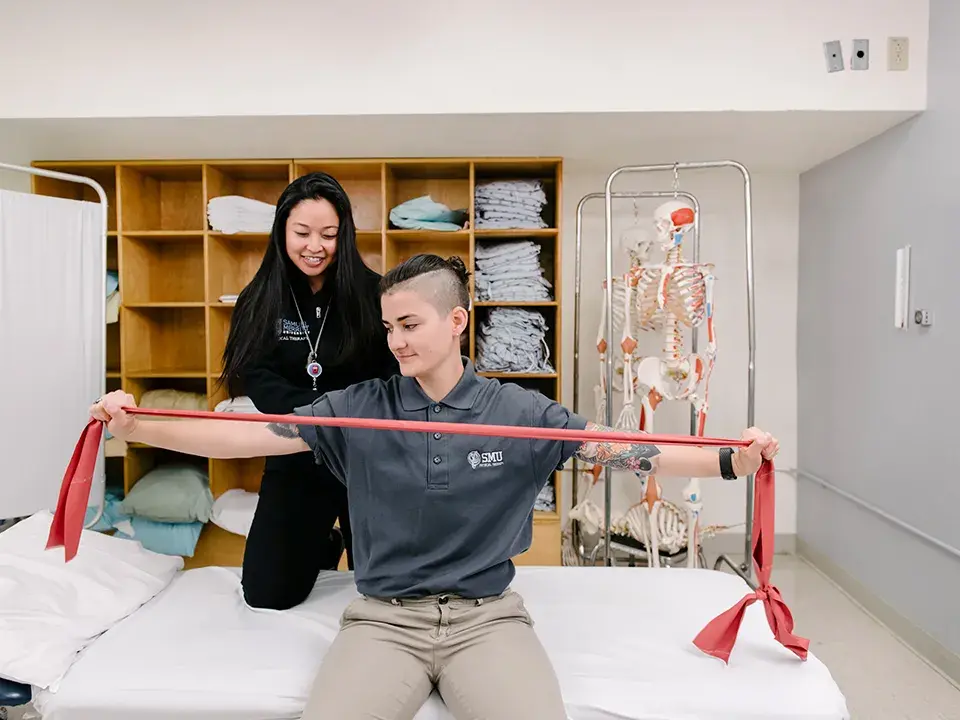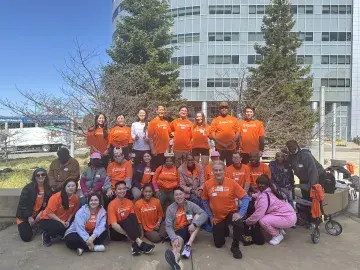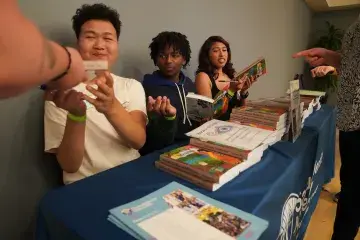Improving People’s Lives Tops Hamburgers and Coke

While studying for her doctorate in physical therapy, Katheryne Tang DPT ’19 found time for international volunteer work and community service. In the days before she walks across the stage to receive her degree, Tang shares how she found her niche, recovered from insomnia, and how her original interest in sports medicine evolved into a desire to work with older adults.
How did you decide to become a physical therapist?
As a kid, I said I either wanted to be a hamburger or a doctor. That’s because I always loved hamburgers, but also wanted to be in the medical field to help others. However, I never found my niche. As an undergrad, I switched majors often because nothing felt like a good fit. I decided on a degree in marketing, but by then I had developed a problem with sleeping at night. For years, I tossed and turned for hours ruminating on the thought that my life was going to be wasted since I wouldn’t be directly helping anyone.
I hit my final straw during my last internship at Coca-Cola. I was sitting in a business meeting and it hit me that I absolutely couldn’t spend my life talking about money. I went home that day and researched medical field options. I don’t know how I had overlooked physical therapy in the past but when I found it, I knew it was perfect. It would allow me to work long enough with patients to build relationships while helping them get back to living the lives they wanted. Right after I graduated, I went back to school for two years to complete prerequisite courses.
I was accepted to Samuel Merritt University (SMU) and, although I’m not any closer to becoming a hamburger, now I’m closer to helping people and haven’t lost a night of sleep since I got into the program.
How have you been changed by your SMU education?
I recognize that there are harder things in the world, but completing the Doctor of Physical Therapy (DPT) program has been one of the hardest things I’ve had to do. Once you come out of a program like this, you realize there aren’t many other things in life that are more difficult so you’re capable of doing anything else life throws at you.
What have been the highlights of the DPT program for you?
The DPT program itself has been great, but it’s been the opportunities outside of the classroom that have been the most transformative for me. I joined the International Healthcare Club and went on a medical mission last year to Batata, Panama. While there, I realized there was one impairment for which none of us could provide long-term care; poor eyesight that in some cases correlated with headaches.
When I got back from the trip, I had a conversation about the problem with Diana Bang, a friend I met in Panama who is a student in SMU’s Master of Physician Assistant program. We started a drive to collect used glasses to distribute to the people of Panama. So far, we’ve collected over 200 glasses and have two optometry offices participating in the program. We’d love for this to be a program that continues to grow so more individuals can receive the eyewear they need.
Also, during an outpatient orthopedic clinical rotation, I worked with several older patients who told me they sometimes go hungry because they were too immobile to go to the grocery store. While I could help improve function or these patients so they could independently get food, I knew there were more people who I’d never get to treat. I felt I had to do more. That’s when I decided to volunteer with Meals on Wheels so that more people could have access to nutritious food.
These two opportunities have really solidified what we learn in the DPT program; we should always consider the entire person when we work with our patients. I hope to continue finding ways to make people’s lives better.
What does commencement mean to you?
Commencement is the celebration of all the hard work, patience, and persistence we’ve had to put into the last three-plus years of our lives. It means I’m just that much closer to being able to spend my life helping others live their lives as healthily as possible.
What are your professional plans?
I originally got into physical therapy to work in sports medicine, but during the last three years I’ve realized how much I enjoy working with an older population, particularly individuals with neurological impairments. Therefore, I would like to consider residencies in geriatric and/or neurologic care.
I’d also like to open my own private practice eventually. I’ve seen too many patients discharged prematurely because of financial limitations so I’d like to start a program in my clinic that would allow for some pro bono services. Everyone should be able to live as functionally as possible and the ability to pay should never be a factor.
What advice would you offer to students just beginning the DPT program?
You’re going to have good days, mostly hard days, and days when you’re unsure about whether or not you’ll be a competent clinician. When in doubt, remember that you are capable and you have to trust yourself and the process.
Also, remember that grades are important but they’re not everything; learn the content and practice the skills for your future patients and they will be better off because of it. Lastly, everyone in your class will have different strengths so don’t worry about not being the best at everything; your time to contribute your strengths will come.
Tell us your story. Tell us about a friend. We want to hear about students, alumni, and faculty who are breaking the mold and living SMU's mission.


